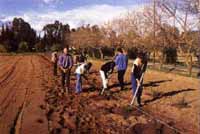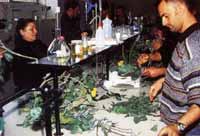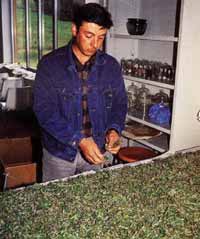|

Gennargentu
National Park
The name "aromatic and medicinal plants" is given
to all those plant species which contain active
substances in their structure. They can be grouped, according
to their use, in aromatic plants and plants used for seasoning food
and making liquors, medicinal and healthy plants, dyeing, biocidal
and repulsive plants and plants used to make cosmetics and perfumes.
In Ogliastra, a region in the
central-eastern side of Sardinia which is part of the Gennargentu
National Park, there are areas with a high naturalistic value, rich
in officinal botanical species which grow wild in this area. The
land is suitable for the cultivation of aromatic and medicinal plant
species both at the sea level (in the areas of the municipalities
of Tortolì, Barisardo and Tertenia) and at medium altitudes (areas
of Urzulei, Talana, Arzana and Villagrande). This is the reason
why Tortolì was chosen to organize the training courses, attended
between the months of March and May 1998 by 15 farmers residing
in the area of the Gennargentu National Park.
|
workers
making the ground

|
|
Description
of the intervention
and of training courses
The total duration of the training course was of about 200 hours,
150 of which in a classroom and 50 hours in some Italian farms and
companies where medicinal plants are produced and processed.
The aim of the course was to train the
participants with the most adequate techniques for the
rational growing, harvesting and processing of medicinal plants.
The course was structured according to some modules and followed
this process: we started from the techniques
to determine the wild species, we talked about the main
techniques to grow medicinal plants and, finally, the first processing
and the introduction into the market
were treated.
By the "Istituto Professionale di Stato per l’Agricoltura e l’Ambiente"
(Institute of Agriculture) of Tortolì (province of Nuoro), an experimental
field was created where 300 little plants
of various botanical species used to make seasoning of food and
liquors and medicinal plants were planted. The cultivation of these
plants allowed to "live" directly all the possible situations in
the management of land with medicinal plants: sowing, biological
pest control, the techniques for irrigation and the harvesting stages.
Among the subjects treated, the first processing of the product
was particularly important. After the verfication of the balsamic
time (the time with the highest concentration of active
elements in some parts of the plant), some samples of thyme, eucalyptus,
rosemary, lavender and other plants were taken and the trainees
used them to try distillation techniques for the extraction of essential
oils. The essential oils are
extracted by means of a distiller, formed by a pipe-coil plunged
into a refrigerating container; the essence produced can be widely
used in various sectors of food and cosmetics industry and in phytotherapy.
The market value of these products can be very high, for several
kilograms of plant mass are needed to produce a few milliliters
of essential oil.
Some training modules went thoroughly into the techniques for plant
mass drying process to prevent it from putrefying, into phytotherapy
and the legislation that regulates this sector. Some exercises
and group workshops simulated situations and problems
related to the product’s marketing. The worldwide market of medicinal
plants, and the relevant costs and incomes were analyzed.
The training courses organized in Sardinia in the "Società Cooperativa
Erbosard" of Orosei (province of Nuoro) and in the leading companies
in Italy dealing with processing and selling of the product had
a great importance. The trainees could directly see some production
contexts and understand what is the position of the companies in
the market.
|
medicinal
plants :
laboratory works


|
|
Results
and consequences
for the participants
and the area
The 200 hour course allowed the participants to know medicinal plants
and their products in general; they could develop a new entrepreneurship
idea and start some experimental cultivations in their fields.
The ERSAT ("Ente Regionale di
Sviluppo e Assistenza Tecnica in Agricoltura", a service authority
of the Regional Administration of Sardinia dealing with the development
and technical assistance in agriculture) will guarantee the technical
assistance to the trainees, some cultivations will be established
and the selection of better plant varieties will be experimented
through some tests and analysis.
It is possible to say that a new trend of ecocompatible entrepreneurship
development has been inaugurated, a kind of development which is
strictly connected with the natural resources offered by the area
where the Gennargentu National Park is.
|
|



